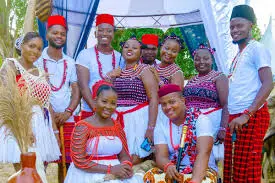
Kuhaswa – Traditional Giriama wedding
The parents of the bridegroom look for the bride. They go to the bride’s home and the bridegroom’s father introduces himself and then says ”Fudzire mala Mudzungu wa utsunguni”. We have come to look for the cucumber, which is painful. The father of the bride answers ”nauhambale” let the painful cucumber spread. The bride is then called by the father and asked any question that will take time to answer, for the intention of the parents of the bridegroom is to look and observe her body language. If the bridegroom’s parents are impressed by the bride’s character and presentation, they say that they are contented and then fix a date for the bridegroom to come and see the bride for the first time.
The bridegroom is accompanied by friends and cousins to meet the bride. When they get there, the bride says that he has been sent by his father to come and pay a visit to the village. The father-in-law understands and calls for his daughter to bring some water to the visitors. The bridegroom is not necessarily thirsty but takes the opportunity to make the bride stay there for some time so that he can observe her physical features. When contented, the bridegroom, tells the bride’s grandma that ”mautu ni tototo”-meaning he is pleased.
The bride and the bridegroom are put in one room so that they can introduce themselves to one another and this is how it goes-: They start by telling their names, then: ” Nidzire haha henu Kwa sababu nidza fahirwa ni uwee, je unanambadze?”- I have come to your home because I have a passion for you, what do you say about that? The bride may decide to conceal her feelings- “sidzihisi ma mtu yoyosi mino ” I do not feel for anybody. The bridegroom goes on persuading her ”Mwanzangu umudzo zhomu na nahenza nikuhale fukale hamwenga siku zosi ” My friend you are so cute and I wish to marry you we be together for the rest of our lives. The bride shrugs her shoulders meaning that she has agreed but cannot say it verbally. The bridegroom stands and hugs the bride then he goes out of the house. He tells the grandma that things are okay and they leave. The bridegroom tells his parents he is pleased and procedures follow.
The parents of the bridegroom go to the bride to discuss dowry. The parents of the bride ask for ”ndama” bull and ”kadzama mirongomiri na nane” eight liters of liquor (mnazi) that will be sent twenty-eight times. A day for giving the bull and the liquor is planned, the visitors go to the bride and a ceremony is held. This time they take the bride with them. They sing and dance. The main song is ”Nangoza mwanangu, dama mwana anenda, zho kwaatu, anenda kwa mulumewee…dede, mudzungu wa utsunguni nau hambale” meaning am nursing my daughter dama, the daughter is going to peoples home, to her husband, my dear the cucumber of pain let it spread. “The father-in-law asks for a blanket as a gift to bless the couple. The mother-in-law asks for a ”mkamba wa kureka mwana” The kanga for carrying the baby. The bride is blessed and asked to agree with all that her husband tells her. The father-in-law takes water and swirls it in his mouth then blows it on the chest of the bride and the bridegroom. The mother-in-law does the same. The bride-groom is told that the bride is not a ball for him to beat all the time, he is advised to protect the bride in happiness and problems.
 Colors
Colors  Privacy Policy
Privacy Policy  Support
Support 












Damerys Damer
July 8, 2024What about the kifunga mlango,is there something like that that the groom is to give?
Erick Saddam
September 4, 2024Yes, it is there, it signifies that the girl is now part of the family. Normally, After the negotiation, the groom's female relatives will visit the bride's family to present a "Kitamba cha Utumba" as a symbol of "Kifunga Mlango" or "closing the door," The Kitamba cha Utumba package might include:
- Coconut oil, bath soap, and laundry soap (Mafuta ya Nazi, sabuni ya kogea na ya kufulia) - A pair of slippers for the shower (Viatu vya kuogea champali) - Two pairs of Kanga cloth (Gora mbili za Lesso) - A toothbrush and toothpaste (Mswaki na dawa ya meno)